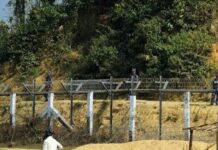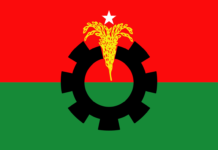
The government would hold talks with Chinese officials tomorrow as part of its desperate efforts to give impetus to the mega projects held up by the coronavirus pandemic.
Bangladesh’s development activities came to a grinding halt in late March after the government was compelled to enforce a strict countrywide shutdown to limit the spread of the deadly virus.
The move did not spare the major projects, many of them were already running behind schedule mainly due to uncertainty over funding, complexity over designs, planning and land acquisition.
The construction sector though was expected to get momentum after the government partially lifted the lockdown on 30 May although the pandemic is far from over.
The two-and-a-half-month-long shutdown has seriously paralysed the implementation of the mega projects as foreign workers and engineers could not join their workplace because of the lockdowns in their home countries and the suspension of commercial flights.
This led the government to sit with the officials of the Asian Development Bank and India to discuss how to accelerate the implementation and disbursement of more funds to make up for the losses.
Last week, the Economic Relations Division (ERD) held a meeting with officials of India to accelerate the implementation of the ongoing projects bankrolled by New Delhi.
Now, the finance ministry has decided to hold a virtual meeting with the Chinese embassy in Dhaka and project officials tomorrow to find ways to put them back on track again.
The ministry has set an agenda to discuss the Padma rail link project, the single-point mooring (SPM) with double pipeline project, the multilane road tunnel under the Karnaphuli project and the expansion and strengthening of the power system network under the Dhaka Power Distribution Company area.
They are part of the 27 projects Bangladesh and China agreed to implement during Chinese President Xi Jinping’s visit to Dhaka in October 2016, the first by a Chinese president in 30 years.
The world’s second-largest economy has promised about $20 billion — the largest amount yet by a single country — over the next four years at the time.

Four years on, only a fourth of the amount has entered Bangladesh’s aid pipeline.
The outbreak of the coronavirus in China and later in Bangladesh severely affected the Padma Bridge rail link project that was being constructed by China Railway Group.
In early July, the government revised the budget for the SPM with double line project for the second time, increasing it by 21 per cent.
The cost of the project overran by 33 per cent from the original budget because of the delays in securing loans, the appreciation of the US dollar against the taka and a threefold rise in the price of land.
The original cost of the project was about Tk 4,936 crore. In the first revision, it was raised to Tk 5,426.3 crore. The second revision took it to Tk 6,568.3 crore.
In December last year, a new deadline of 30 June 2022 was set.
The SPM will have an annual unloading capacity of 9 million tonnes. It will unload 120,000 tonnes of crude oil in 48 hours and 70,000 tonnes of diesel in 24 hours.
The main objectives of the project are to ensure the unloading of imported crude oil and finished products with ease, safety, at a low cost and within a short time, reducing system losses in the import of crude and finished products through lighterage operations.
It will also maintain a balance between the growing demand of energy and its supply and enhance the petroleum oil retention capacity through the setting up of a diesel and crude oil storage tank farm at Moheshkhali and increasing energy supply.
The Karnaphuli Tunnel project in Chattogram has achieved a breakthrough with the completion of the left line despite the pandemic. China Communications Construction Company is implementing the project.
The tunnel, the first underwater tunnel in South Asia, will connect the port city with the other side of Karnaphuli river, improve traffic movement in Chattogram and promote the economic development of Bangladesh, said the Chinese embassy in Dhaka in a press release on 3 August.
It will also contribute to the improvement of the Asian Highway Network and connectivity between Bangladesh and its neighbours.
The tunnel is being built at a cost of Tk 9,880 crore to turn Chattogram into “One City, Two Towns”.
Out the 27 projects, commercial agreements for seven projects involving $5.4 billion have been signed as of June 2020. China has disbursed $1.54 billion.
Two more projects involving $439 million that are not included in the list of the 27 projects are also being implemented. Beijing has disbursed $249.3 million for them.
Bangladesh is implementing nine projects bankrolled by China. Disbursement totalled $1.8 billion against the commitment of $7.1 billion as of June, according to the ERD.
Tuesday’s meeting will also discuss the next priority list containing the remaining 16 projects. Dhaka has sent the list to Beijing seeking funds.
The list includes Dhaka Ashulia Elevated expressway ($1.2 billion), the double line (dual gauge) between Joydebpur-Ishwardi section ($1 billion), and the conversion of Metre Gauge Railway Track into dual gauge in Akhaura to Sylhet section of Bangladesh Railway ($1.3 billion).
The government would also sit with the World Bank.
Bangladesh is particularly keen to speed up the implementation of the mega projects after the country’s annual development programme fell to a 27-year low in the just-concluded fiscal year.
The ministries and divisions managed to spend Tk 161,857 crore in fiscal 2019-20, which was 80.5 per cent of the total allocation for the year.
This fiscal year’s ADP is Tk 204,144 crore.









